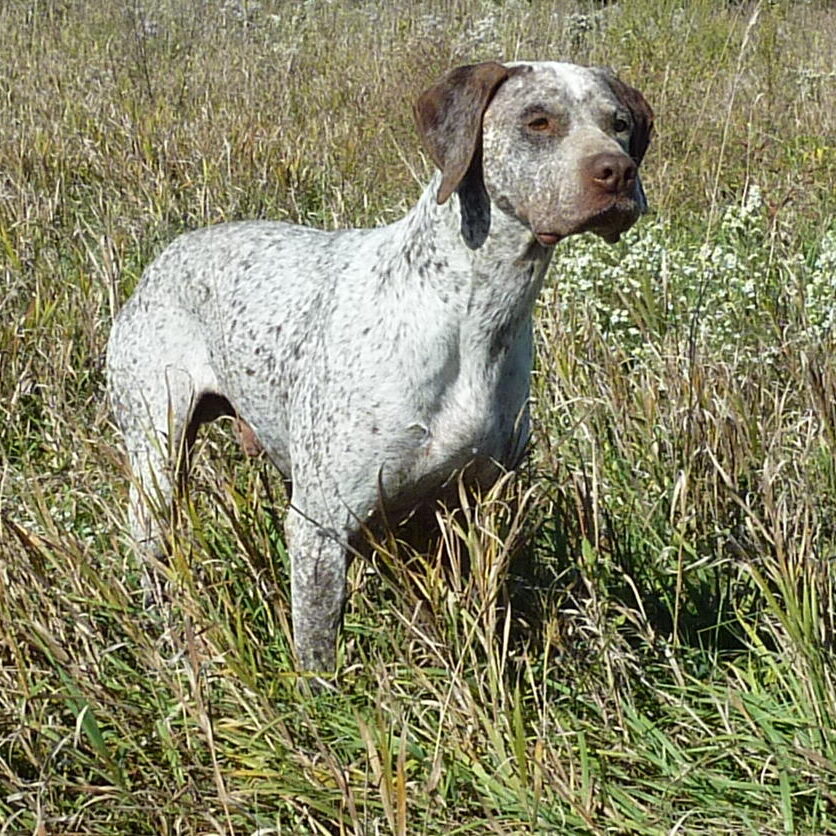Rufnit Kennels Braque du Bourbonnais – Feeding Your Rufnit Puppy
Feeding Your Rufnit Puppy
(General Information)
Rufnit Companions are fully weaned by the time they are eight weeks old. To avoid upset stomachs when you bring your puppy home, be sure to ask what the puppy has been eating. Any changes made from that diet should be made very gradually (including “snacks/treats”).
A puppy’s energy and nutrient requirements is two to four times that of an adult dog of the same breed until it reaches 50% of its adult body weight (usually 3-5 months of age). It then decreases to one and a half times that of an adult dog until the puppy reaches 80% of normal adult weight.
It is essential that puppies (and adult dogs, for optimum health!) be fed premium quality foods that contain high quality, highly digestible protein and very little indigestible filler. Puppies, have small stomach capacities. If they eat poor quality food, they are not able to obtain the nutrients they need from the quantity they are able to consume and they can suffer from low blood sugar, a potentially serious condition. Furthermore, poor quality commercial foods may substitute high levels of inexpensive bone meal protein for more expensive meat protein.
A puppy younger than 12 weeks old needs to be fed four times a day. After 12 weeks of age and until six months, puppies should be fed three times a day. Allow your puppy to eat at least five to ten minutes before withdrawing the food. If you have more than one puppy or dog, always feed each separately so the dominant puppy or dog won’t get all the food. Make sure his food is fresh and his dish is washed with soap and hot water before each meal. Make sure fresh water is always available. Never play hard with a puppy just before or after eating. Besides being common sense for good digestion, rough play or exercise close to mealtime can cause a life-threatening condition called bloat in some deep-chested dog breeds.
When puppies are teething, they may go “off” their food slightly because of the discomfort. Watch your puppy carefully and never let a puppy go for more than 24 hours without eating, especially if there are other symptoms present, such as vomiting or diarrhea. Contact your local Veterinarian with any concerns you may encounter.
Note: Rufnit Companions have had the foundation training to implement the above “General Information.” It is NOT recommended to impose the above methods on a pup that has not been previously conditioned.
- Upcoming Litters
- Puppy and Litter Info
- Comments & References
- Breeding, Whelping & Raising Time Line
- Vital Periods in Your Puppies Growth
- Rufnit Puppy Information
- What is a Reputable Breeder
- Pick A the Litter – by J.D. Wills
- The 10 Commandments From a Pet’s Standpoint
- To Reserve Your Braque du Bourbonnais
~~~~~~~~~~~~~~~~
Sole recipient of the prestigious
“Natural Ability Breeder Awards”
presented by NAVHDA for the
Braque du Bourbonnais
~~~~~~~~~~~~~~~~
Producing…
the FIRST litters of
Naturally Short Tailed/Tailless
Braque du Bourbonnais’
in North America
~~~~~~~~~~~~~~~~
| Rufnit Kennels, LLC is honored to be recognized and supported by the Club du Braque du Bourbonnais (breed club in the country of origin – FRANCE) |

There are many reputable breeders of fine upland hunting dogs throughout North America. Unfortunately in this business like so many others, the buyer needs to be aware. Make sure that the puppy comes from a line of dogs that have good health credentials. There should be a good history in the pedigree of dogs that perform in the field (field trials, hunt tests, etc.). As a rule, avoid “backyard breeders.” Leave the art and science of breeding to the breeders experienced with the breed and have produced proven progeny. Take the time to make contacts and see if there are any consistent problems reported about the particular breeder you have selected. NAVHDA (North American Versatile Hunting Dog Association) is the foundation registry and testing organization for the Braque du Bourbonnais in North America. We sell to only responsible owners and utilize the “Breeding Restriction” registration offered by the registries. Rufnit Kennels assumes a lifetime responsibility for the canine lives we place on this earth. We require the dog/pup be returned to Rufnit Kennels should a situation arise and a dog/puppy need to be relocated.
Remember that the least expensive part of the cost of a dog is its initial price. Vet bills, feeding, kenneling, training etc. are what really cost the most. Our advice: Do your research, you and your companion will benefit in the long run.
License #KN744
Rufnit Kennels, LLC BdB * C/O Shari Stueck * 5900 Saltillo Road * Lincoln NE 68516-9209 * (402) 423-0995 or (402) 560-8652
